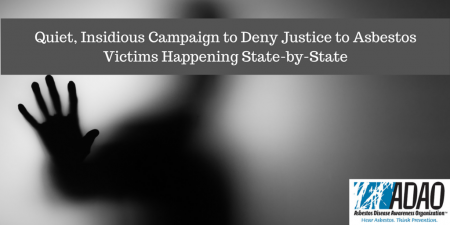Posted on March 1, 2016
 Injustice.
Injustice.
Over the last few years, legislation to delay and deny compensation to those sick and dying from asbestos-triggered diseases has been introduced and become law in 6 states. Commonly referred to as the Asbestos Bankruptcy Trust Claims Transparency Act or the Fairness in Asbestos Claims Transparency (FACT) Act, the laws are similar, and originated with the Right Wing bill mill, the American Legislative Exchange Council, or ALEC.
The states where the laws are already on the books include:
- Ohio (2012);
- Oklahoma (2013);
- Wisconsin (2014);
- West Virginia (2015);
- Texas (2015); and
- Arizona (2015).
States where legislatures are currently considering similar proposals include:
- California (A.B. 2315);
- Pennsylvania (H.B. 1428);
- South Carolina (S. 281);
- Missouri (H.B. 2438);
- Indiana (H.B. 1225);
- New York (A.B. 5978 and S.B. 5504);
- Tennessee (H.B. 2234 and S.B. 2062);
- Utah (H.B. 403); and
- Michigan (expected to be introduced soon).
At their core, these 6 state laws and the pending legislation awaiting action in 9 other states, are designed to erect a series of legal and administrative hurdles almost impossible to clear by plaintiffs and their attorneys BEFORE they can even set foot in a court room; much less see any measure of justice by way of compensation.
Some of those barriers common among many of the laws and bills include:
- Forcing plaintiffs to disclose confidential settlement negotiations;
- Giving asbestos defendant companies unlimited power to run out the clock on sick and dying victims and their families, by allowing them to submit numerous motions that repeatedly stay or delay a case; and
- Re-writing established tort law to let the responsible asbestos corporations off the hook for poisoning victims.
In some cases, the FACT Act legislation is introduced in conjunction with another, even more damaging piece of legislation commonly called the Asbestos Claims Priorities Act, which would require victims to file extensive documentation of their claims at the time of the complaint—greatly increasing pleading requirements specifically and only for asbestos plaintiffs—including:
- Plaintiff’s full name, address, date of birth, social security number, marital status, occupation and employer;
- Specific location and manner of each alleged exposure, including exact dates of exposure, and the identity of the manufacturer of each product that led to each alleged exposure;
- A detailed “medical, social, and smoking history;”
- Evidence of 15-year latency period between the plaintiff’s first asbestos exposure and symptoms; and
- Sworn statement from the plaintiff’s treating physician including a “detailed narrative medical report and diagnosis” as well as an assertion that the asbestos exposure was a “substantial factor” in the plaintiff’s illness.
This legislation would also greatly increase a plaintiff’s burden of proof at trial by requiring evidence of the “dose” of asbestos exposure from each defendant’s product, an impossible task given the size and nature of asbestos fibers. Utah, Tennessee and Michigan legislatures are or will be considering legislation that incorporates the Asbestos Claims Priorities Act provisions.
ADAO will do its best to fight each of these asbestos industry assaults that would only re-victimize victims of asbestos disease. However, we are up against some of the biggest, wealthiest, most powerful corporations and special interest groups in the country, including the U.S. Chamber of Commerce.
We will need all the help we can muster. The best way for asbestos victims and their families to get involved, especially those who live in states where legislation is pending, is to contact your local legislators and urge them to strongly oppose this anti-victims legislation.
Click on your state below contact your state representative.
In unity.
Linda Reinstein
California
Pennsylvania
South Carolina
Missouri
Indiana
New York State Assembly
New York State Senate
Tennessee
Utah
